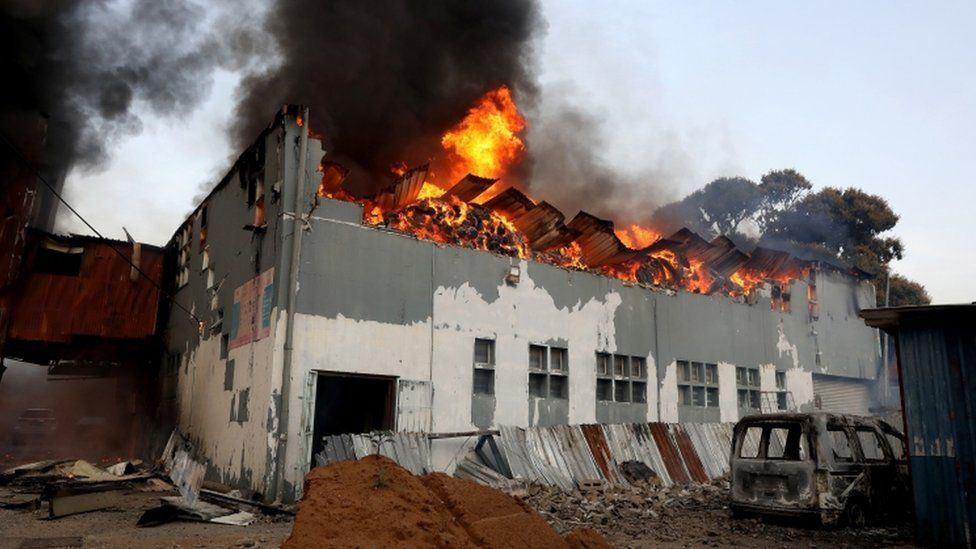No fewer than 72 people have been killed with more than 1,000 arrested in the ongoing riots sparked by the imprisonment of former South African President Jacob Zuma.
Recall Jacob Zuma turned himself to begin serving a 15-month prison term after the Constitutional Court sentenced him to prison for defying a court order that he should testify before a commission investigating allegations of rampant corruption when he was president from 2009 to 2018.
His imprisonment sparked unrest and riots with people looting from shops and warehouses in several part of the country.
The South African Police Service said in a statement that the death toll had risen to 27 in Zuma’s home province of KwaZulu-Natal and to 45 in the economic hub of Gauteng province, with many of the fatalities occurring in “stampedes” as scores of people looted food, liquor, clothes and electrical appliances from shops in poor areas.
Other deaths were caused by explosions when people tried to break into ATM machines as well as shootings, according to police.
At least one police officer was killed in an attack on law enforcement, while seven others were injured while responding to the riots, police said.
So far, 1,234 people have been arrested, according to police, but the chaos has continued. Looters were seen ransacking warehouses and supermarkets in the port city of Durban on Tuesday, while rioters set fire to a chemical plant near the town of Umhlanga, just north of Durban.
The South African Police Service has reportedly recalled officers from leave and rest days, while the South African National Defence Forces have deployed thousands of soldiers to assist in the unrest.
South African President Cyril Ramaphosa has vowed to “restore calm and order,” describing the unrest as the worst the country has witnessed since the 1990s, before the end of the apartheid regime.
“Over the past few days and nights, there have been acts of public violence of a kind rarely seen in the history of our democracy,”
Ramaphosa said in a televised address to the nation on Monday evening.
“Let me be clear: We will take action to protect every person in this country against the threat of violence, intimidation, theft and looting. We will not hesitate to arrest and prosecute those who perpetrate these actions and will ensure that they face the full might of our law.”
The lawlessness has disrupted South Africa’s COVID-19 vaccination programme, which Ramaphosa warned will have “lasting effects on our ability to consolidate some of the progress we were already witnessing in our economic recovery.”
Meanwhile, acting minister in the presidency Khumbudzo Ntshavheni said that the South African Police Service (SAPS) has arrested an alleged instigator who helped to organise the looting and violence in South Africa this past week.
In a media briefing on Thursday afternoon, July 15, Ntshavheni said that this suspect was currently in custody, with the SAPS working to arrest a further 11 subjects who had a hand in coordinating the attacks.
Ntshavheni would not be drawn on the specifics around who had been arrested as it could compromise the investigation. “It is only when people have been arrested and appeared before the court that the names can be revealed,” she said.
enior ANC and intelligence sources told The Daily Maverick that twelve ringleaders were identified by security intelligence officials, who were suspected of being behind the unrest. they said that these individuals used social media to set the carefully planned attacks into motion.
During the special ANC National Executive Committee (NEC) meeting held on Monday, which was focused on addressing the unrest, WhatsApp and Telegram messages – which appear to show a coordinated effort to carry out the violent attacks – were discussed.
These messages are now being analysed by security intelligence officials who have set their sights on catching the instigators, the Daily Maverick reported.
Screenshots of the messages, which were posted on an “eThekweni Shutdown” WhatsApp group, have been shared on Facebook.
The first point of focus for the instigators was the torching of trucks and blocking major roads and highways around Durban, Pietermaritzburg, and various spots along the N3.
According to The Daily Maverick, this was organised by renegade MK groups who were active in the truck transport sector and have campaigned against foreign truck drivers for some time.

